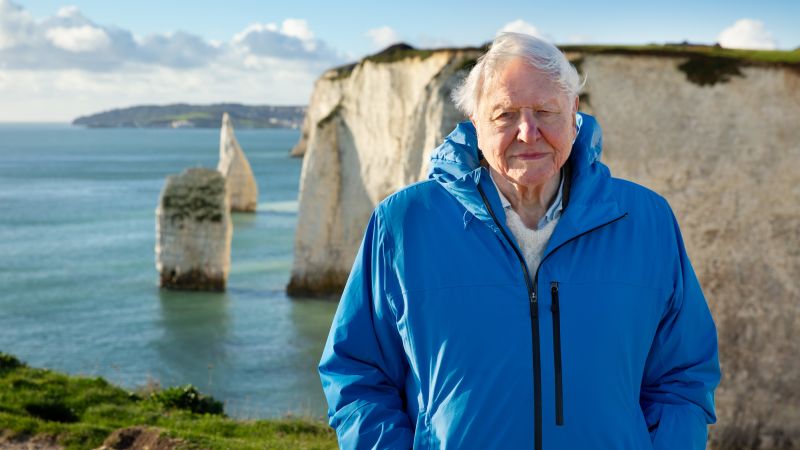**Editor’s Note**
The “Call to Earth” series launched by CNN is an editorial initiative dedicated to highlighting the crucial environmental challenges confronting our planet while also shedding light on possible solutions. In partnership with Rolex’s Perpetual Planet Initiative, CNN aims to bolster awareness and education on vital sustainability issues, spurring positive action across communities worldwide.
**Beginning of a Journey**
The film “Ocean with David Attenborough” opens with breathtaking visuals of crashing waves and shimmering sea spray, inviting viewers into the deep, calm expanse of the ocean. Attenborough, a veteran broadcaster renowned for his storytelling about the life on Earth, emphasizes that “the most important place on Earth is not on land but at sea.” His latest project, released in cinemas on the eve of his 99th birthday, is a poignant tribute to our oceans and the changes they have undergone throughout his lifetime.
**Changing Horizons**
Attenborough reflects on a hundred years filled with discoveries, where scientists and explorers have unveiled astonishing new species, intricate ecosystems, and epic animal migrations previously unimagined. Through this film, he aims to not only celebrate these discoveries but also to unearth the urgent health crisis of our oceans and propose pathways for their restoration. The viewer is taken on a visual journey through coral reefs, kelp forests, and immense seamounts, showcasing the ocean’s essential role in combating climate change as it serves as the globe’s largest carbon sink.
**The Grim Reality**
However, the documentary starkly confronts the alarming threats faced by our oceans. Filmed against the backdrop of an unprecedented marine heatwave, the visuals depict widespread coral bleaching, transforming once-vibrant reefs into desolate, white graves reminiscent of ghostly underwater landscapes. Footage from locations like the Mediterranean Sea vividly illustrates the disastrous impacts of industrial fishing practices. Attenborough narrates how bottom trawlers devastate marine ecosystems, effectively destroying the seafloor habitat with their heavy chains and indiscriminately capturing a multitude of marine life, only to discard much of the catch targeted at a single species.
**The Ripple Effect**
This grim fishing practice does not just threaten marine ecosystems but significantly jeopardizes the livelihoods of coastal communities that rely on healthy fish populations. Attenborough aptly describes the industrial fishing vessels as “vast factories at sea,” which consume marine resources in a self-serving manner. He further critiques this approach, labeling it as a form of “modern day colonialism.” The extend of this exploitation even reaches the uncharted ocean depths of Antarctica, exacerbating global concerns surrounding marine sustainability.
**A Flicker of Hope**
Despite the harsh realities presented, Attenborough remains optimistic about the ocean’s resilience. He points to successful recovery stories in places like Kiribati and Palau, where coral reefs have made impressive comebacks. Areas associated with fishing bans, such as the Mediterranean’s small marine reserves, show significant ecological rebound. One notable highlight is Papahānaumokuākea off the coast of Hawaii, which is touted as the largest no-fishing zone globally. Reports from local fishers indicate burgeoning fish stocks, exemplifying the potential for marine recovery when given a chance.
**Promising Insights**
Enric Sala, founder of National Geographic’s Pristine Seas program, shares insights from his explorations, affirming the ocean’s ability to recover when protected. His observations underscore the crucial role of fish in maintaining reef health, illustrating nature’s interdependence. Notably, Sala emphasizes that stopping overfishing in selected areas could lead to immediate ecosystems recovery.
**The Call for Protective Measures**
While acknowledging the necessity for fishing, Attenborough posits the need for clearly designated no-take zones to safeguard crucial areas. With less than 3% of oceans currently protected, the call for expanded efforts is urgent. He draws parallels to the global shift in attitudes that restored whale populations post-whaling bans, driving the narrative that successful conservation actions can ignite hostilities towards destructive practices.
**A Pivotal Moment**
“Ocean” is being released just ahead of the United Nations Ocean Conference in Nice, France, with hopes of motivating governmental action. With member states already committing to protect 30% of the world’s oceans, Attenborough advocates for urgency in transitioning promises into reality. He passionately declares, “This could be the moment of change,” summoning collective action to fulfill those proposed goals for oceanic protection.
In a world facing overwhelming environmental challenges, the critical message emerges from Attenborough’s film: swift, collective action can ensure the restoration and safeguarding of our oceans for generations to come.



